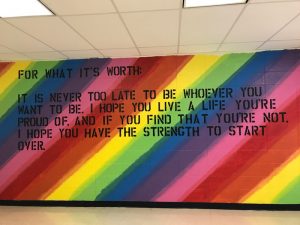Writing for Teachers: Synthesis of Professional Articles
The rising visibility of transgender identity and the debate about transgender bathroom rights playing out on the national stage have led many teachers to wonder how they can best support trans and gender non-conforming students in their classroom. Here I will examine two professional articles from Education Week; the pieces take different educational tactics to approach the same goal of spreading information to educators about creating trans-inclusive schools. “Schools as Instruments of Social Change: Transgender Students and Bathrooms” by Jill Berkowicz and Ann Myers gives teachers a sense of the political climate and structural constrains on trans students’ school experiences, while “Five Myths About Transgender Students Educators Need to Unlearn: Mixed messages about LGBT students permeate school culture” by Laura Erickson-Schroth focuses on more day-to-day information for teachers as they work with trans individuals. However, both articles arrive at the same conclusion: educators must be fearless allies of their trans and nonconforming students in order to create an inclusive school community and ensure the successful learning of all students.

the declatation
Importance of Educators as Supports for Trans Students
Both Berkowicz and Myers and Erickson-Schroth leave readers with a central takeaway: educators must be consistent, reliable systems of support for trans students, and work to promote LGBT inclusivity in their classrooms by educating themselves about the issue. In the words of Berkowicz and Myers, “This is truly a moment for the adults who make decisions about whether they are going to accept social change and create the environments in which all children can flourish to be courageous” (Berkowicz and Myers, 2016). Erickson-Schroth echoed a similar sentiment, saying that “Active work by school staff to educate themselves… lead[s] to a more welcoming school culture” (Erickson-Schroth, 2017). Both demonstrate the vital role that educators play in shaping the experiences and outcomes of transgender students.
Understanding Policy, Supporting Individual Students
The two articles present different ways of achieving the shared goal of increased inclusivity for trans kids in school. Berkowicz and Myers describe in depth the rights of trans students under Title IX, and the ways in which states and districts often manage to violate students’ legal rights. In doing so, they call upon educators to “Be Fearless” (Berkowicz and Myers, 2016). In other words, educators must maintain an active, dynamic knowledge of the legal rights of their students and use that knowledge to fight for the advancement and protection of their trans students’ rights. The authors believe in education and advocacy surrounding social structure and the justice system in order to protect trans students and promote their well-being in school.

glaad
Similarly, Erickson-Schroth also calls upon educators to increase their knowledge of trans issues, thus increasing their capacity to promote an actively inclusive school environment for trans students. However, rather than focusing on the larger social structures, Erickson-Schroth calls upon educators to unlearn certain myths about trans students and trans identities. These myths that she believes educators need to unlearn include, “It’s rude to ask how to address someone” and “Transgender students are mentally ill” (Erickson-Schroth, 2017). The author states that this approach to educating oneself, which focuses on relationships with trans students and their individual experiences, is the ideal way to achieve trans-inclusive schools.
Both articles call on educators to teach themselves about trans issues in order to change schools. They focus on two different types of education to achieve this: education about broader social systems, and education about supporting individual students. Despite their different approaches, both articles highlight the importance of educators having knowledge about this issue in order to make a change for trans kids in school.
